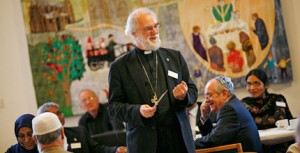“Rejoice always, pray constantly, give thanks in all circumstances; for this is the will of God in Christ Jesus for you” [1 Thess 5:16-18].
Sr. Joan Chittister and Archbishop Rowan Williams are renowned spiritual guides of the contemporary times. One is a prolific writer, an international lecturer and former Benedictine Prioress from America, and the other is an erudite theology professor turned Archbishop of Canterbury. They come from two different traditions and occupy two vastly different chairs, one Catholic and religious, and the other Anglican and clerical. And yet, they share a depth-spirituality that led them to co-author a book titled “Uncommon Gratitude: Alleluia for All That Is”.
(L) Sr. Joan Chittister. (R) Archbishop Rowan Williams
In the marketplace of spiritualities, they both are clearly marked by a monastic mindset that valued reflection. They both take ideas very seriously. They both know in their bones that God is a mystery in which they live every moment of every day. That’s how Sr Joan begins her introduction to the book.
But who is this God, really?
“Is God a teasing giant who must be pacified as we go through life? Is life an obstacle course designed to merit only the perfect, only the docile? Or is the human condition a bundle of gifts wrapped in darkness, the life task of which is to recognize Goodness/Godness in all its misty forms?”
One thing the authors are sure about is this, that the presence of God in life requires “conscious contemplation”. In that contemplation, God cannot be reduced to catechism-answers. And yet, in the God who cannot be simplified, we find all the answers we need to live life confidently in what is “seen” and be grateful as well for all the gifts that are also “unseen”. So, for Archbishop Williams, what interests him most in the spiritual life is the meaning of “alleluia”.
Life for them both is a learning to sing alleluia in good times and in bad, in order to recognize the hidden face of God. Above all, to get to the meaning of alleluia in life, we must face those difficult and harsh moments in life which do not feel like alleluia moments at all. The difficult question is: “But how is it possible to say alleluia to the parts of our life that weigh us down, that drain our spirits dry, that seem to deserve anything but praise?”
Life is like an accounts ledger, where there are pluses and minuses. Life is a journey, often uncharted and full of surprises, where we experience gain and loss, joy and sorrow. Alongside success and satisfaction, we encounter failure and disappointment. Life, in the language of Karl Rahner, SJ, is full of unfinished symphonies. That being the case, why practice alleluia, save to encourage “some kind of emotionally unhealthy self-deception?”
Certainly not. Alleluia is never meant to be a substitute for the harsh reality in life wherever harshness occurs. It is simply an awareness of a wholly different kind of reality beyond, beneath and above the harsh reality of every here-and-now where harshness occurs. Alleluia takes us beyond the instant perception of what is seen, to the acceptance of a Creator-God who is good.
This is where the humourous and yet deeply serious teaching of our near-retiring theology teacher, Professor Emile Mertens, has left a lasting influence. When we say in the Creed “I believe in God, the Father the almighty, maker of heaven and earth,” we mean to say that we accept Him as Creator, but we also mean to say a whole lot more than that. What we are primarily saying is that, as Genesis 1 has described and so we accept, that what God has given us in the universe is “good”. Accepting creation, we are going to enjoy it, whatever it entails – the lows and the highs, the joys and the sorrows. And we accept all as good because, the professor insists, it is made by God and not made in Japan!
All too common in life, we forget to thank God in good times, and we blame God in bad times. The call by Chittister and Williams to alleluia is a call to meditation, to accept the interplay between life as a gift and life as a challenge, to rise above a mere choice between total jubilation and abject despair, and to learn to cling to a sense of alleluia for both the good times and the bad. In all this, Hemingway makes perfect sense: “Life breaks us all, but some people grow at the broken places.”
Alleluia then is an expression of thanksgiving, for it says that God is good, and we know it.
Copyright © Dr. Jeffrey & Angie Goh, June 2010. All rights reserved.
You are most welcome to respond to this post. Email your comments to jeffangiegoh@gmail.com. You can also be dialogue partners in this Ephphatha Coffee-Corner Ministry by sending us questions for discussion.


